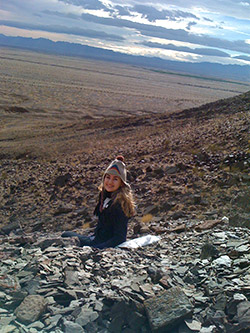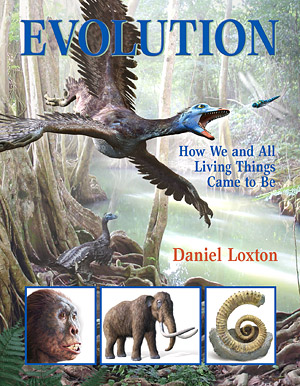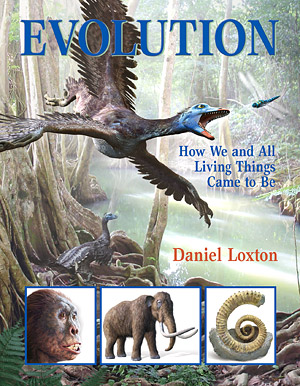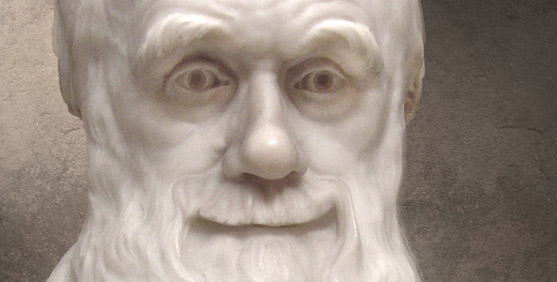by
Michael Shermer, Mar 15 2011
What does the democratic uprising in Egypt and other Arab nations have to do with IBM’s Jeopardy champion Watson in determining the fate of civilization? Think bottom up, not top down; think exponential growth, not linear change; think crowd sourcing, not elite commanding; and think open access and transparency, not closed entree and secrecy. Under the influence of these four forces, such seemingly unconnected events are, in fact, connected at a deeper level when we pull back and examine the overall trajectory of the history of civilization. Continue reading…
comments (58)
by
Michael Shermer, Dec 21 2010

click to enlarge photo
This past weekend, December 17–19, 2010, I joined paleontologists Donald Prothero from Occidental College and John Long from the Natural History Museum of Los Angeles County on a fossil hunting, rock hopping, geology viewing, petroglyph scanning excursion through the Mojave Desert between Los Angeles and Las Vegas. Through the entire trip I kept thinking “I wish the creationists and Intelligent Design theorists would try their hand at some actual field work because then they would see (and hear and smell and especially touch) what nature is really like and what the history of life reveals in the rocks, instead of sitting in an air-conditioned or heated office in some think tank building or school of theology department, trolling through published papers by real scientists who do this field work, trying to find some little gap that must be filled by the creating designer. Continue reading…
comments (26)
by
Daniel Loxton, Oct 26 2010
 I'm elated to announce that my Junior Skeptic-based book Evolution: How We and All Living Things Came to Be is a 2011 nominee for the prestigious Silver Birch® Nonfiction Award! This is a tremendous honor (for which I thank my illustration collaborator Jim W. W. Smith, my editor Valerie Wyatt at Kids Can Press, producer Pat Linse — and the Skeptics Society for making the project possible in the first place).
I'm elated to announce that my Junior Skeptic-based book Evolution: How We and All Living Things Came to Be is a 2011 nominee for the prestigious Silver Birch® Nonfiction Award! This is a tremendous honor (for which I thank my illustration collaborator Jim W. W. Smith, my editor Valerie Wyatt at Kids Can Press, producer Pat Linse — and the Skeptics Society for making the project possible in the first place).
Each year, the Ontario Library Association showcases selected titles for its Forest of Reading® program — a heavily-promoted recreational reading initiative, widely supported throughout Ontario's public schools and public libraries. Among the 250,000 participating young readers, kids who read a minimum of five of the 10 books in their reading category will become eligible to vote for the award in that category.
The Forest of Reading program runs throughout the Spring, culminating with award ceremonies in front of an audience of several thousand at Canada’s largest literary event for younger readers: the Festival of Trees™ at the Harbourfront Centre in Toronto (May 11 and 12, 2011).
Continue reading…
comments (26)
by
Daniel Loxton, Mar 05 2010
Even before I started writing Evolution: How We and All Living Things Came to Be I knew that it would very briefly mention religion, make a mild assertion that religious questions are out of scope for science, and move on. I knew this was likely to provoke blow-back from some in the atheist community, and I knew mentioning that blow-back in my recent post “The Standard Pablum — Science and Atheism” would generate more. And, I should have realized that I was muddying the water by packaging multiple related issues together in one post: the specific wording of a passage in my book; the question of whether that passage should have been included; and, the wider question of how science and skepticism relate to atheism.
Still, I was surprised by the quantity of the responses to the blog post (208 comments as of this moment, many of them substantial letters), and also by the fierceness of some of those responses. For example, according to one poster, “you not only pandered, you lied. And even if you weren’t lying, you lied.” (Several took up this “lying” theme.) Another, disappointed that my children’s book does not tell a general youth audience to look to “secular humanism for guidance,” declared that “I’d have to tear out that page if I bought the book.” Continue reading…
comments (97)
by
Daniel Loxton, Mar 02 2010
I’m pleased to say that the release of Evolution: How We and All Living Things Came to Be has been enjoying quite a bit of attention from skeptics — which has helped this full-color kids’ book get off to a great start. Perhaps the most rewarding moment for me so far was receiving a warmly positive quote from Dr. Eugenie Scott (Executive Director of the National Center for Science Education and 2010 National Academy of Sciences “Public Welfare Medal” recipient). Genie is one of the softest, yet most forthright and resolute voices in skepticism, and a great inspiration to me personally. You can imagine my elation when she said,
I am just so delighted with this book! Loxton hits the key concepts perfectly, and without being stuffy about it. A wonderful book to donate to your local library.
I was similarly honored to receive positive reviews from Phil Plait and from P.Z. Myers — both among the most popular science bloggers on Earth. I just about did cartwheels when P.Z. unexpectedly urged readers to “order a copy fast for the kids in your life!”
P.Z., did, however, dislike one subsection of Evolution:
I recommend it highly, but with one tiny reservation. The author couldn’t resist the common temptation to toss in something about religion at the end, and he gives the wrong answer: it’s the standard pablum, and he claims that “Science as a whole has nothing to say about religion.”
Continue reading…
comments (233)
by
Daniel Loxton, Jan 19 2010

I’m excited to announce the release of my new book Evolution: How We and All Living Things Came to Be (from Kids Can Press). Years in the making, this full-color, illustrated hardcover book based upon Junior Skeptic is available now!
(Also available from bricks & mortar booksellers throughout North America, and from Amazon.com)
The Project
Evolution: How We and All Living Things Came to Be is a straight-ahead introduction to the fact of evolution, to its mechanisms, and to the misunderstandings that surround it. The book aims to explain how evolution works — and how we know for a fact that it happens. It is suitable for readers aged 8 – 13.
Continue reading…
comments (8)
by
Daniel Loxton, Dec 08 2009

“News flash: skeptics hack the Answers in Genesis website!” Or, at least, that was the joke Skeptic co-publisher Pat Linse made when I read her some pro-natural selection material from the young Earth creationist organization’s slick online portal.
For years, I’ve been surprised how rarely this is mentioned: young Earth creationists need Darwin to be right — and when you press them on it, they often agree that he was.
Doesn’t sound like the creationism you know? It’s not a hacker’s prank, and it’s not a radical re-thinking of creationism. It is, however, a nuance as important as it is surprising: creationist leaders share Darwin’s belief that species routinely change (and even originate) through mutation and natural selection.
Continue reading…
comments (72)
by
Michael Shermer, Dec 01 2009
Last week, while I was giving thanks for an abundance of family, friends, and food, a brouhaha was brewing over an invited opinion editorial I wrote for CNN celebrating the 150th anniversary of the publication of Charles Darwin’s On the Origin of Species (on Tuesday, November 24).
The title, “Religion, Evolution can Live Side by Side,” was written by the CNN editors, but it does capture the thrust of the piece which I concluded by noting that if you are a believer in an eternal god, what difference does six zeros make on when the creation happened — 10,000 or 10,000,000,000 years ago — or by what method of creation was used: spoken word or big bang?
Well, this set off a mild firestorm among some observers of the science-and-religion debate, most prominently the estimable Jerry Coyne, the author of one of the best books ever written on the subject, Why Evolution is True, in his website of the same title called me an “accommodationist” and even a “faitheist” (“faith atheist”?) Continue reading…
comments (81)
by
Daniel Loxton, Nov 24 2009
A behind-the-scenes peek at the long road to Evolution — the Junior Skeptic-based illustrated kids’ book due out in February, 2010
Once upon a time my wife and I sat down for scrambled eggs with Michael Shermer and Julia Sweeney.
We were a little giddy. It was our first time in Las Vegas — and our honeymoon. I was a lifelong skeptic attending my first skeptics’ conference: The Amazing Meeting 2, hosted by the James Randi Educational Foundation. (300 skeptics in one room! Imagine it!) And now we were having breakfast with a genuine movie star.
We were chattering away over coffee when Michael clapped his hands together. “Alright,” he said, suddenly all business, every bit the dynamic leader. “Can we get these Junior Skeptic books out this year?” Continue reading…
comments (14)
by
Michael Shermer, Aug 18 2009
Did humans evolve to be religious and believe in God? In the most general sense, yes we did. Here’s what happened.
Long long ago, in an environment far far away from the modern world, humans evolved to find meaningful causal patterns in nature to make sense of the world, and infuse many of those patterns with intentional agency, some of which became animistic spirits and powerful gods. And as a social primate species we also evolved social organizations designed to promote group cohesiveness and enforce moral rules.
People believe in God because we are pattern-seeking primates. We connect A to B to C, and often A really is connected to B, and B really is connected to C. This is called association learning. But we do not have a false-pattern-detection device in our brains to help us discriminate between true and false patterns, and so we make errors in our thinking Continue reading…
comments (138)




